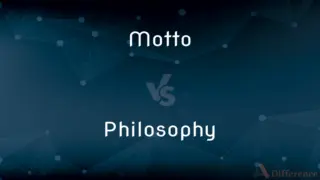Idiolect vs. Ecolect — What's the Difference?
By Tayyaba Rehman — Updated on August 18, 2023
An idiolect is an individual's unique way of speaking, while an ecolect is the speech variation of a specific ecological or social group.

Difference Between Idiolect and Ecolect
Table of Contents
ADVERTISEMENT
Key Differences
An idiolect refers to the distinctive speech patterns, vocabulary, and grammar of an individual. On the other hand, ecolect is tied to a particular ecological or social community, highlighting shared linguistic traits of that group.
An idiolect remains singularly unique, emphasizing individual variations rather than communal ones. In contrast, ecolect focuses on a more collective aspect of language. When people live in a specific ecological or social setting, they develop shared ways of speaking that reflect their common experiences and environment. This linguistic variation is termed an ecolect.
Within a larger dialect or language, both idiolects and ecolects can exist. For instance, within the English spoken in New York City, there may be ecolects tied to specific neighborhoods or communities. Simultaneously, each individual within those communities will have their idiolect, a personal twist on the shared linguistic features of the community.
Comparison Chart
Scope
Individual
Community/Group
Origin
Personal experiences and choices
Shared ecological or social setting
ADVERTISEMENT
Change Over Time
Can change with individual experience
Evolves with group dynamics
Representation
Unique to each person
Shared by members of a group
Influence
Personal history, education, etc.
Environment, communal experiences, etc.
Compare with Definitions
Idiolect
An individual's personal linguistic style.
His idiolect is easily recognizable by his use of uncommon words.
Ecolect
A language variety unique to a household.
Idiolect
The unique way of speaking specific to one person.
Her idiolect includes a mix of three different regional accents.
Ecolect
A shared linguistic system within a specific environment.
The forest tribes have an ecolect filled with terms related to the natural world.
Idiolect
The singular speech patterns of a person.
His idiolect has traces of his time spent abroad.
Ecolect
Linguistic characteristics common to a group's shared experiences.
City dwellers have an ecolect influenced by urban life and its challenges.
Idiolect
A person's individualized language system.
Though we come from the same town, our idiolects are vastly different.
Ecolect
The speech variation of a particular ecological or social group.
The coastal community has a distinct ecolect, shaped by their marine experiences.
Idiolect
A linguistic pattern distinct to an individual.
Your idiolect is like a vocal fingerprint, unique to you.
Ecolect
The collective way of speaking in a particular community.
The ecolect of that mountain region reflects their shared history and culture.
Idiolect
Idiolect is an individual's unique use of language, including speech. This unique usage encompasses vocabulary, grammar, and pronunciation.
Ecolect
The communal linguistic patterns within a defined setting.
The ecolect of that island community incorporates many sea-related terms.
Idiolect
The speech of an individual, considered as a linguistic pattern unique among speakers of that individual's language or dialect.
Idiolect
(linguistics) The language variant used by a specific individual.
Idiolect
The language or speech of one individual at a particular period in life.
Idiolect
The language or speech of one individual at a particular period in life
Common Curiosities
How is ecolect different from idiolect?
Ecolect refers to the shared linguistic patterns of a specific ecological or social community, highlighting communal traits rather than individual ones.
Why is idiolect important?
Idiolect is crucial because it emphasizes individual linguistic identity, offering insights into a person's background, experiences, and personal choices.
What is an idiolect?
An idiolect is the unique linguistic style and patterns of an individual, shaped by their personal experiences, choices, and background.
Can someone have both an idiolect and be part of an ecolect?
Absolutely. While an individual has their own idiolect, they can also exhibit features of an ecolect from the community or group they belong to.
Why do ecolects develop within communities?
Ecolects arise from the need for shared language tools that reflect common experiences, environments, and challenges faced by a community.
What factors influence an ecolect?
An ecolect is influenced by shared experiences, environment, cultural practices, and history of a particular ecological or social group.
Is an idiolect static throughout a person's life?
No, an idiolect can change over time, influenced by experiences, education, travel, and personal growth.
How can one identify their own idiolect?
By observing personal speech patterns, vocabulary choices, and linguistic nuances that differ from others, even within the same linguistic community.
Can there be multiple ecolects within a larger dialect?
Yes, within a broader dialect, there can be several ecolects tied to different ecological or social communities.
Is it possible for a person's idiolect to clash with their community's ecolect?
While they might exhibit features of both, there can be instances where an individual's unique linguistic choices (idiolect) might not align entirely with the communal speech patterns (ecolect).
Share Your Discovery

Previous Comparison
Characterization vs. Personification
Next Comparison
Motto vs. PhilosophyAuthor Spotlight
Written by
Tayyaba RehmanTayyaba Rehman is a distinguished writer, currently serving as a primary contributor to askdifference.com. As a researcher in semantics and etymology, Tayyaba's passion for the complexity of languages and their distinctions has found a perfect home on the platform. Tayyaba delves into the intricacies of language, distinguishing between commonly confused words and phrases, thereby providing clarity for readers worldwide.












































